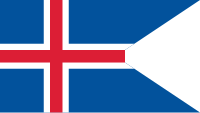Icelandic Defence Agency
| Military of Iceland | |
|---|---|

State flag of Iceland
|
|
| Service branches |
Icelandic Coast Guard Iceland Crisis Response Unit |
| Headquarters | Reykjavík, Iceland |
| Leadership | |
| Minister for Foreign Affairs | Guðlaugur Þór Þórðarson |
| General Director of ICG | R.Adm Georg Kristinn Lárusson |
| Manpower | |
| Military age | 18 |
| Available for military service |
73,557 males, age 18–49 (2015), 71,172 females, age 18–49 (2015) |
| Reaching military age annually |
2,349 males (2015), 2,217 females (2015) |
| Reserve personnel | 230 (ICG) |
| Deployed personnel | 200 (ICRU) |
| Expenditures | |
| Budget | US$45,529,700 |
| Percent of GDP | 0.26% (2015) |
| Related articles | |
| History | Military history of Iceland |
| Ranks |
Coast Guard officers Coast Guard enlisted |
Iceland's defences consist of the Icelandic Coast Guard, which patrols Icelandic waters and airspace, and other services such as the National Commissioner's National Security and Special Forces Units. Iceland is however the only NATO member which maintains no standing army, although there is no legal impediment to forming one and Icelandic services perform the operations fellow NATO allies relegate to their standing armies.
The Coast Guard consists of three ships and four aircraft and armed with small arms, naval artillery, and Air Defence weaponry. The Coast Guard also maintains the Iceland Air Defence System, formerly part of the disestablished Defence Agency, which conducts ground surveillance of Iceland's air space.
Units subordinated to the National Commissioner also take part in Iceland's defences. Foremost of these are the National Security Unit, which handles intelligence operations and the special unit Víkingasveitin, a highly trained and equipped counter terrorism unit which is part of the National Police force.
Additionally there is a Crisis Response Unit (ICRU), operated by the Ministry for Foreign Affairs, which is a small peacekeeping force that has been deployed internationally, since 2008. This unit also has an unarmed component.
Furthermore, there is a treaty with the United States regarding the defense of Iceland; the former maintained a military base known as Naval Air Station Keflavik before it was disestablished in 2006. There are also agreements about military and other security operations with Norway,Denmark and other NATO countries.
Iceland holds the annual NATO exercises entitled Northern Viking. The most recent exercises were held in 2011, as well as the EOD exercise "Northern Challenge". In 1997 Iceland hosted its first Partnership for Peace (PfP) exercise, "Cooperative Safeguard", which is the only multilateral PfP exercise so far in which Russia has participated. Another major PfP exercise was hosted in 2000. Iceland has also contributed ICRU peacekeepers to SFOR, KFOR and ISAF.
...
Wikipedia
